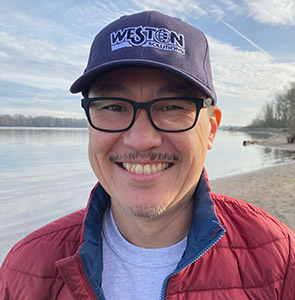Hometown/home base: From urban Los Angeles, CA/Portland, OR.
Years at Weston: 4
Current role/previous professional experience: Project Manager in hazardous, toxic, and radioactive waste projects and environmental/regulatory compliance for federal clients across the western US; has been a remedial project manager and enforcement officer at US EPA; watershed technician with Cal EPA; and small business owner.
On his unique path to a STEM career and Weston: “Initially, I wanted to pursue my interests in writing and literature immediately out of high school. However, I could not complete a degree due to financial reasons and left college after a year to work full-time for about 10 years. However, I always had an innate interest in biology, and after a few camping experiences, I realized the importance of protecting nature for the benefit of city kids, like myself.
When I did return to school in 1999, I attended San Francisco State University and double majored in Natural Resource Management and Conservation (BS), and Geography (BA). I had a couple of great internships during college, which helped me focus my areas of study to watershed management and CA salmonid habitat restoration.
In retrospect, I enjoyed all my college classes, and credit my professors, the generosity of environmental professionals that offered me internships, and the interdisciplinary program that I eventually completed for helping me succeed. It’s these folks that have put me on the path of paying it forward and supporting young people as they try to navigate their own careers, as well as encouraging Black, Indigenous and People of Color (BIPOC) to explore and be comfortable in nature. I get to continue paying it forward today by mentoring Indigenous STEM students through a program with Dine’ College, first when I was with EPA, and now with Weston. I also mentor STEM students of all backgrounds at Portland State University, as a volunteer.
I wanted to join Weston because, as a Weston client while at EPA, I was impressed with the quality of the people that I had worked with, specifically when placed in challenging situations on Navajo Nation projects.”
Points of pride and work highlights at Weston: “I love helping people, and I have been pleased to support large emergency responses under our EPA START contracts, continue working on remediation of abandoned uranium mines on the Navajo Nation, as well as provide COVID support to federal and tribal government agencies. Internally, I have been extremely impressed at the efficient, thoughtful, common-sense handling of COVID policies to protect our safety and health.
I am proud to have been able to establish two new clients (Indian Health Service and Navajo Engineering and Construction Authority) in 2020 to help address the COVID impacts affecting the Dine’ (Navajo) people, unfortunately one of the populations most impacted by the pandemic.
This two-year CARES Act-funded project to improve clean water access involves supporting the most vulnerable of the Dine’ community—families that do not have running water in their homes, who must haul their water for drinking, cooking, and cleaning from sources sometimes hours away, and who are often hampered by a digital divide—lacking reliable internet and cell service to get critical information during COVID. By working closely with federal and tribal agencies, as well as a larger network of nongovernmental organizations that focus on the health of at-risk communities, we are developing multi-mode communication strategies and tools to let families know how they can obtain free, clean drinking water, and stay safer and healthier through COVID.”
Advice on encountering bias based on personal experience: “I grew up in a very diverse region and have been blessed to have shared experiences growing up with different ethnic groups in the LA area. As an adult, I moved to another diverse area, the San Francisco Bay Area. Those of us whom have spent time around other cultures know that this is rich ground for building character and communication skills.
Despite a racially diverse landscape, racism, prejudice, and bias have also been a commonplace part of my experience, both personally and professionally. It was not until I had a project in HI that a distinct difference from my typical experiences on the mainland became clear: first, there were many environmental professionals of Asian, Pacific Islander, and mixed heritage; second, without prior knowledge of who I was, they were much more open to me as a fellow professional; and third, my contributions to conversations were equally valued, and there was no feeling of being “passed over” as is typical in less diverse groups.
The environmental field is generally known to lack diversity, and BIPOC environmental professionals are rare—so consider yourself exceptional if you are one! I do expect this to change, as natural disasters become more common, linkages to climate change become better understood, and social and structural climate adaptation becomes a priority. Here, BIPOC professionals are certainly best positioned to develop solutions that do not leave BIPOC communities at the margins, without a voice.”
On his interesting hobby/musical skill: “San Francisco is one of the places responsible for the genesis of turntablism, with the most advanced turntable crews coming out of the Filipino American community just south of San Francisco. During the first generation of musicians that combined jazz and hip hop in the early 90s, I played saxophone and clarinet with hip-hop DJs in the Bay Area. I am very excited by the renewed vibrancy in jazz that I am seeing globally—evidence of one of many African American artforms that have had ripple effects on many cultures. Given this, you could say that we are all being mentored by African American genius!”
